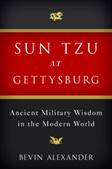
This excerpt was taken from Sun Tzu at Gettysburg by Bevin Alexander. Click here to purchase it from Amazon.com.

Ignoring One's Own Strength
Excerpt from Sun Tzu at Gettysburg, by Bevin Alexander, pages 2 and 3
British leaders [in the American Revolution] largely disregarded their most powerful weapon, the Royal Navy. They might have won the war with few casualties if they had occupied or blockaded all the major American ports and protected their conquests with the Royal Navy. The Americans depended on exports, mostly agricultural or forest based, and on imports of manufactured goods. Closing the ports might in time have led to a compromise. Such a policy would have been consistent with a fundamental Sun Tzu axiom: that one should advance into the enemy’s vacuities, that is, into undefended or indefensible places. The Americans could not have kept any of their ports open against British sea power, as was demonstrated by the ease with which the British seized and held on to New York.
A blockade strategy would have nullified the colonies’ great strength---their vast extent. It would also have nullified the Americans’ ability to wear down the British army by attrition. There would have been no need for land campaigns. British soldiers would have been required to fortify and garrison some but not all of the major ports. Behind such prepared fortifications, backed by Royal Navy guns, the British would have been invincible.<< More 'Rules of War' Excerpts << Back to top